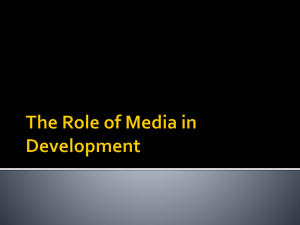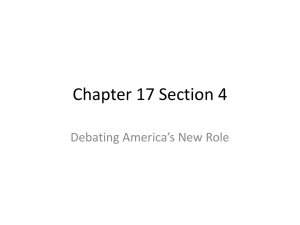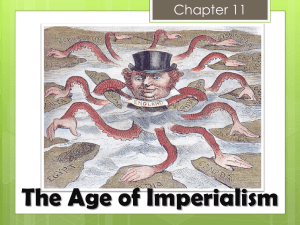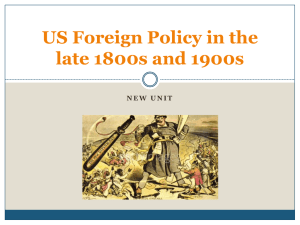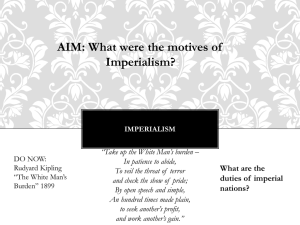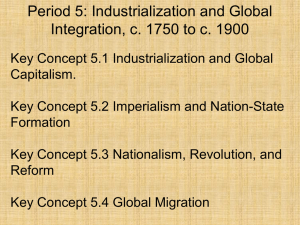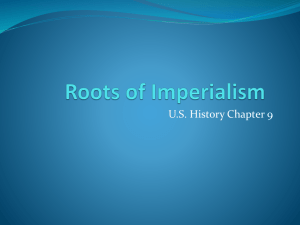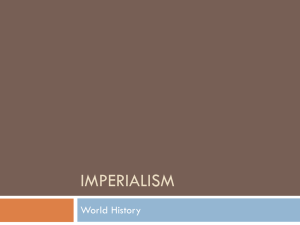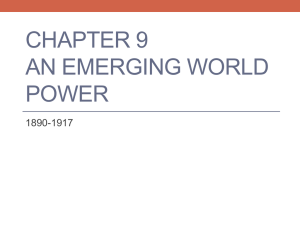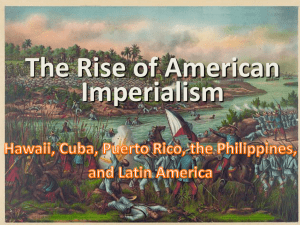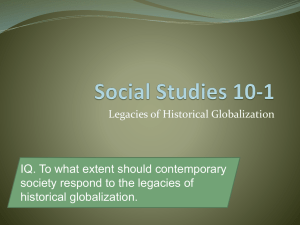Chapter 33 The Building of Global Empires
advertisement
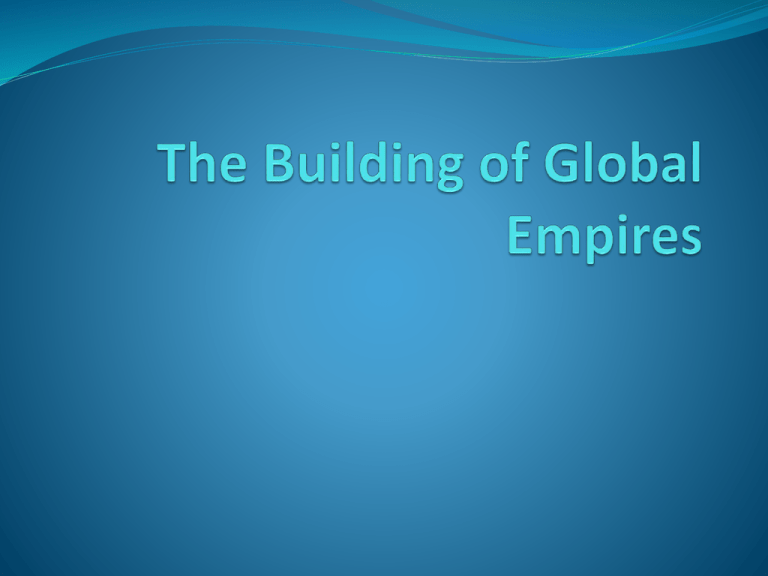
Before We Get Started This is a great chapter and in many ways it contains the heart of this whole course: the dynamics of change and continuity and the causes and processes involved in those dynamics. Think about caparisons and contrasts regarding imperialisms impact among world regions and consider what change occurred within political institutions and economic realms as a result of imperialism. Foundations of Empire Imperialism has been a part of world history since the Mesopotamians, but the inventions and events of the 19th century brought it to a whole new level. Motives for Imperialism Imperialism – The practice of stronger countries dominating the politics, culture, and economics of weaker countries. (Usually economic) Economic Benefits Political / Military Benefits Cultural Justification (Belief in the superiority of white Christians) Foundations of Empire Tools of Empire Industrialization led to powerful new weapons that allowed Europeans to impose their rule throughout the world. Gunpowder Rifles Machine Guns New modes of transportation allowed easier travel and administration of imperial realms Steamships Railroads Canals (Suez and Panama) New modes of communication allowed for more efficient communications throughout imperial empires Telegraph European Imperialism The 2nd half of the nineteenth century was characterized by a frenzied round of empire building. British in India European expansion into central Asia Establishment of colonies in southeast Asia Mad “scramble for Africa” Subjugation of Pacific Ocean Territories European Imperialism The British Empire in India British control of India grew out of the mercantile activities of the British East India Company in the mid 1600s. With the demise of the Mughal Empire after 1707 the British East India Company and eventually the British government established increasing control in India. 1857 Sepoy Rebellion – British Military officers in India slaughtered by sepoys (Indian soldiers) and local elites Britain responded by tightening control in India by establishing direct Imperial rule. Extended their rule throughout the British subcontinent and dominated almost all aspects of the Indian government and economy. European Imperialism Imperialism in Central Asia and Southeast Asia Central Asia By the 1860s Russia had gained control over the caravan cities of the ancient silk roads and were looking to extend into the northern frontier of India (The “Great Game” for influence and intelligence in Central Asia) Southeast Asia Spanish – Philippines Dutch – Indonesia British – Singapore French – Indochina (Cambodia, Vietnam, Laos) European Imperialism The Scramble for Africa 1875 – European interest in Africa revolved around the exchange for gold, ivory, and palm oil for European textiles, guns, and manufactured goods. 1900 – European powers had partitioned and colonized almost all the African continent in the “scramble for Africa.” Motivated by a quest for resources and nationalistic rivalries. European Imperialism The Scramble for Africa Knowledge of the great African rivers allowed Europeans to access Africa’s interior, which in turn led to rapid colonization of Africa. Belgium – Congo River Basin Britain – Egypt Dutch, Germans, and French – South Africa Dutch of Cape Town, South Africa known as the Boers or Afrikaners. Boer War (1899-1902) – War between British and Dutch for control of South Africa. Brutal conflict that resulted in the death of thousands of blacks and whites. Boers defeated. Union of South Africa, a large, autonomous British dominion was eventually formed and was made up of Afrikaners as well as British settlers. European Imperialism The Scramble for Africa The Berlin Conference 1884-1885 Defining political event in the partition of Africa. European countries delineated acceptable strategies for carving the African continent into European colonies Only Ethiopia and Liberia remained independent of European control. Burdens of Imperialism in Africa Many European countries thought that their African colonies would become self-supporting, but such perceptions were wrong. African colonies proved to be expensive and difficult to maintain. European Imperialism European Imperialism in the Pacific Imperialism in the Pacific took two main forms: settler colonies, as in Australia and New Zealand, and commercial bases, as on most of the Pacific Islands. Australia and New Zealand Europeans began to settle there in the late 1700s Impact on the indigenous people was profound Pacific Islands French – Tahiti Britain – Fiji Germany – Marshall Islands Natives on all islands suffered greatly from European diseases The Emergence of New Imperial Powers Through much of the nineteenth century imperialism was a European affair, rapid industrialization and a fear of being excluded from global influence lead Japan and the U.S. to seek imperial status. U.S. Imperialism in Latin America and the Pacific Monroe Doctrine – Established the U.S. as a protectorate of all the Americas. New lands Alaska (1867), Hawaii (1898), Cuba, Puerto Rico, Guam, and the Philippines (1898 Spanish American War) Roosevelt Corollary – 1904 became part of the Monroe Doctrine and stated the U.S. right to intervene in the domestic affairs of nations within its hemisphere, if those nations were unable to maintain the security necessary to protect U.S. economic interests. The Emergence of New Imperial Powers Imperial Japan Demands of industrialization and the dissatisfaction at the treatment by the U.S. and the European powers in the 1860s pushed Japan to raise its profile in the world. Sino-Japanese War (1894) – Japan v. China for control of Korea. Japan wins and establishes control of Korea, Taiwan, and other formerly Chinese islands in east Asia. Russo-Japanese War (1904-1905) – Japan v. Russia for control of parts of Russian east Asia and Manchuria. Japan wins. Legacies of Imperialism Empire and Economy Globalized economy surged during the nineteenth and twentieth centuries Traditional economies in imperialized nations suffered Labor Migrations Imperial power encouraged mass migration of laborers during the nineteenth and early twentieth centuries to exploit the demand for natural resources and agricultural products. Empire and Society Movement of workers produced multicultural societies Imperialism bread racism Scientific Racism – Pseudo scientifically based Popular Racism – Opinion based Legacies of Imperialism Nationalism and Anticolonial Movements The responses of the subjugated peoples to European, American, and Japanese imperialism was to eventually breed anti-colonial responses and ultimately nationalist movements. India’s response to British imperialism is the most profound example!
